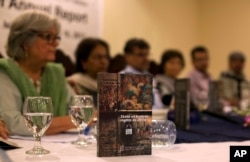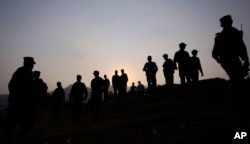A Pakistani government crackdown on social media to deter anti-military content has prompted accusations of curbing freedom of expression and victimizing political activists.
Prime Minister Nawaz Sharif's government last Sunday ordered the cybercrime department of the Federal Investigation Agency to proceed against activists "dishonoring" the national armed forces through social media.
Authorities have since detained and interrogated an unspecified number of activists and seized their computers and cellphones. Most of the detainees belong to the opposition Pakistan Tehrik-e-Insaf (PTI) party, headed by Imran Khan.
An independent watchdog group, the Human Rights Commission of Pakistan (HRCP), has harshly criticized the crackdown. In a statement Friday, it demanded an end to "arbitrary curbs" on freedom of expression and a "climate of intimidation" of political activists, bloggers, journalists and other civil society activists.
'Hostility' toward free speech
"We hope the authorities realize how the prevailing situation demonstrates their hostility towards freedom of expression," the HRCP said.
Khan has also accused the government of abusing the cybercrime law to "politically victimize" PTI's social media activists. The opposition politician has been organizing street protests to pressure Sharif to resign, accusing him of corruption.
"Do not force PTI to come out on to the streets. We will never let you muzzle public dissent against you," Khan warned the Sharif government while addressing a party rally in the southwestern city of Quetta on Friday.
He alleged that the ruling party through fake accounts had unleashed an anti-army campaign in order to provoke the crackdown on social media activists of PTI. Khan's party has been good at using social media to mobilize public support and highlight alleged corruption cases against government leaders.
The Sharif government has defended the punitive proceedings against social media activists, saying the constitution does not allow citizens to criticize the national armed forces.
'Serious offense'
"Ridiculing the Pakistan army or its officers on social media in the name of freedom of speech is unacceptable" and "a serious offense" under the law, the federal interior minister warned while ordering authorities to arrest and take "severe" action against those involved in such "condemnable" activities.
In its statement, HRCP dismissed those assertions and reminded authorities that the constitution also says any restriction with regard to freedom of speech "must be reasonable and shall not take effect if provided by law."
The powerful military has ruled Pakistan at three different times, for a total of more than three decades, through direct coups against civilian governments. Critics say it continues to influence political affairs, particularly foreign policy.
The military, particularly its spy agency, also has long faced foreign criticism for allegedly harboring militants involved in cross-border attacks in Afghanistan and India.
Analysts say that despite the controversies surrounding the military, the institution has benefited from constitutional provisions that curtail criticism of it.






